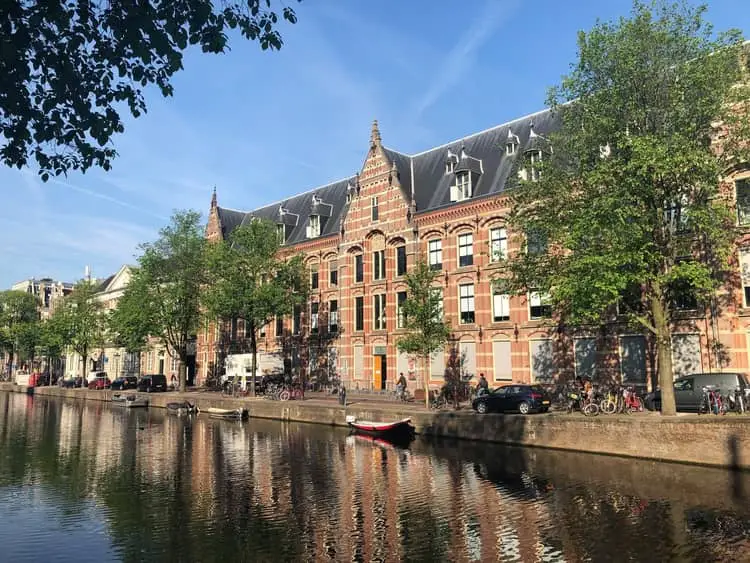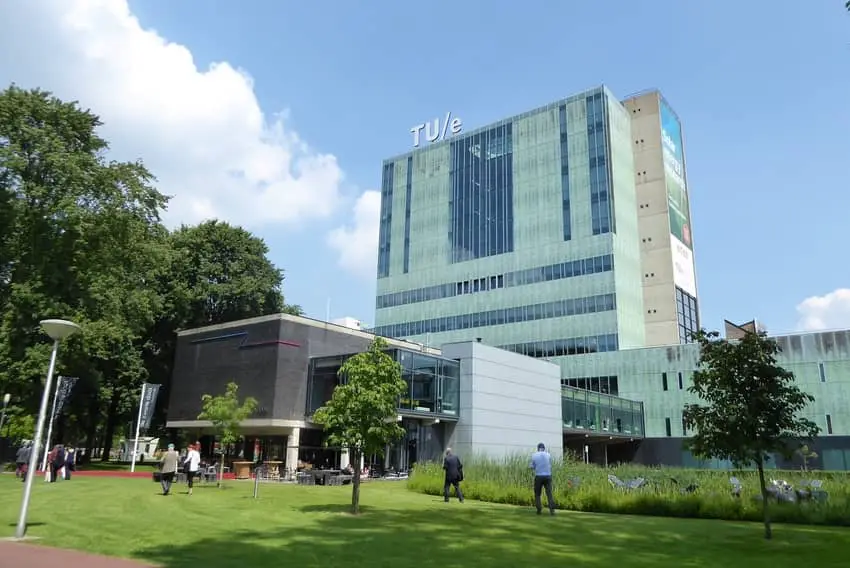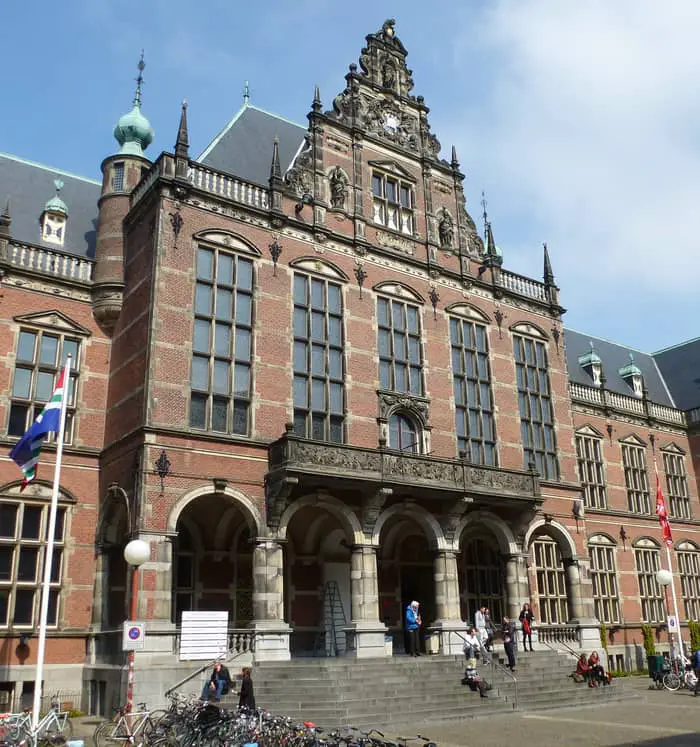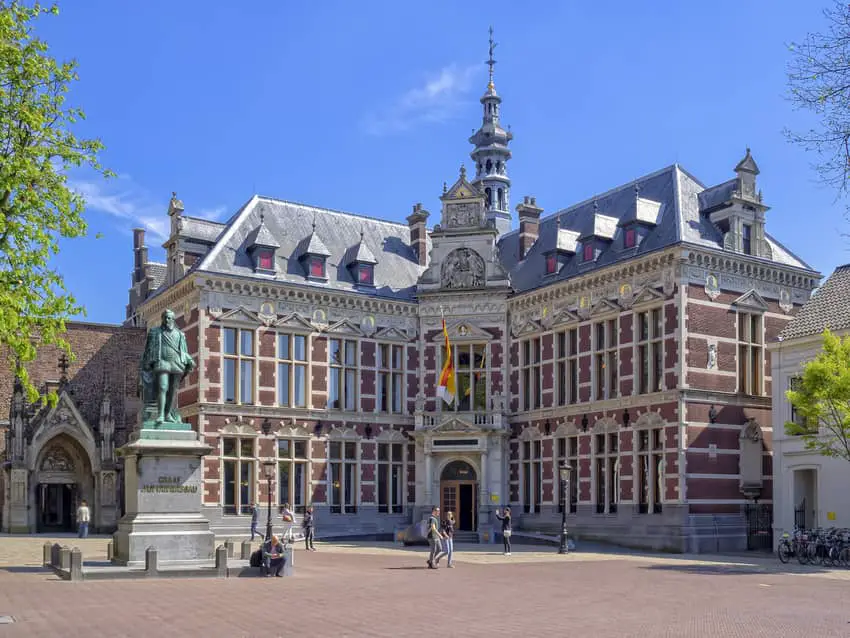The Netherlands is an outstanding country, the best country in several categories. It the number one country when it comes to water infrastructures, the country with more bikes per capita, the number one lowest country in the world, the number one country with the tallest people on Earth, the number one flower exporter and it also has some of the number one universities in Europe and the world.
According to the QS World University Rankings, the best Universities in the Netherlands are:
- Delft University of Technology
- University of Amsterdam
- Eindhoven University of Technology
- University of Groningen
- Utrecht University
- Leiden University
- Wageningen University and Research Centre
- Erasmus University Rotterdam
- University of Twente
- Radboud University
The Netherlands has many universities and many of them are on the top 100 in the world. Each university specializes on something and some of the programmes inside each university are also especially good. If you want to know more about each university and what is the main characteristic that makes them stand out among the rest, keep on reading this article.
Studying in the Netherlands: Universities
The Netherlands is considered one of the best places to study for several reasons. It is not only one of the countries in Europe with the highest living standards but it also attracts people from all over the world who want to study in the Lower Lands. Here there are some of the reasons why anyone would want to study in the Netherlands:
- Most programmes are in English: unlike other universities in Europe, at least half of the Bachelor programmes in most Dutch universities are in English and almost all the Master programmes are in English too.
- High Standards: most universities have a lot of requirements for people who want to study there. The level of English has to be high, you may need letters of recommendation from previous institutions and much more. If you want to know about all the requirements, read here.
- Relatively cheap: if you want to understand how tuition fees work in the Netherlands, click here to read my article. In a nutshell, if you have a European citizenship you will be able to study any program for around 2000-3000 per year. Something rather good in comparison to other European countries that offer English speaking programmes.
- Good infrastructures: most Dutch universities are very new or have older space renovated. They count with the highest technologies inside the classrooms and all around the campus.
- International staff and students: knowing that there will be professors and students from all over the world no matter what program you are studying, it is definitely an added value to the university.
Rankings take several important characteristics into consideration called ratio. The percentage works as following:
- Academic Reputation (40%)
- Employer Reputation (10%)
- Faculty/Student Ratio (20%)
- Citations per faculty (20%)
- International Faculty Ratio (5%)
- International Student Ratio (5%)
Delft University of Technology Delft University of Technology Delft University of Technology
According to the QS World University Ranking 2020, Delft University of Technology (TUDelft) is number 50 in the world, the 8th in Europe and the best Dutch university. According to the World University Rankings 2020 it is the number 19 university of technology in the world.

The Delft University of Technology, as its name indicates, it is a technological university that offers all sort of programmes to become engineer, biotechnology, design, architecture and all sort of applied sciences. It is, therefore, the best technological university in the Netherlands too.
Why Is It the Best One?
- Many programmes: this university offers a limited number of BA programmes (almost 30 of them) and almost half of them in English, yet the really interesting part is in the specific preparation: there are over 100 MA programmes and tracks for choosing a specialization. One of the broadest offers in the whole world.
- Infrastructure: TU Delft has well-equipped laboratories and workstations and unique large-scale technological research facilities, such as a wind tunnel and a flight simulator. There are also 1,000 study places, some equipped with PCs, for which no reservation is needed.
- Living there: it is one of the best-prepared universities in the Netherlands when it comes to accommodation. The rest of the country represents a nightmare for international students to find a place to live. TU Delft has solved that problem by offering a Campus and being in a rather small city.
- IT Facilities: to make applied sciences studies way better. TU Delft offers unique IT facilities such as an extensive package of hardware, software, and connectivity.
- Career Centre: a career centre in a place like TU Delft in the Netherlands is key for a great future. Counting with the support of alumni and their companies such as KLM, Philipps, Rotterdam’s school of architecture, Rotterdam’s port, Eindhoven and Schiphol airport, Shell and more is definitely something to consider when choosing a university.
- Tuition fee: if you want to know more about your tuition fee as an international student, you have to consider if you are an EU student or not. If you are an EU student you will have to pay for the Statutory fee, which is the same as most universities in the Netherlands, around 2000 euros, the best deal for an applied sciences programme. If you are a Non-EU student, check more information about your case here.
- Institutional Scholarships: unlike the rest of Dutch universities, TU Delft counts with privately-funded scholarships: for Aerospace Engineering, the university has a private scholarship for excellence; for Applied Sciences, the university offers the possibility to apply for a TU Delft Excellent Scholarship, Faculty Scholarship, QuTech Scholarship and Fullbright one; for Architecture & the Built Environment, Mechanical, Maritime and Materials Engineering and for Civil Engineering & Geosciences also the TU Delft Excellent Scholarship; for Electrical Engineering, Mathematics and Computer Science, besides the QuTech and the TU Delft one, the Microelectronics department one; and for Industrial Design Engineering the Faculty of IDE Excellence Scholarship, the TU Delft one and the Fulbright Scholarship.
University of Amsterdam
According to the QS World University Ranking 2020, the University of Amsterdam is number 64 in the world, on the top 20 of European universities and the second best Dutch university. According to the US News Best Global Universities, it is the 40th best university and the 10th in Europe.

The University of Amsterdam (UvA) is the largest university in the Netherlands, offering the widest range of academic programmes and one of the widest range of programmes in English. At the UvA, 30,000 students, 6,000 staff members and 3,000 Ph.D. candidates study and work in a diverse range of fields, creating a richer environment for everybody to take advantage of.
What Does Make the UvA so Good?
- English programmes: this university offers 15 BA programmes in English and up to 200 MA programmes. This is definitely one of the biggest offers of English programmes in a non-English speaking country. This is also possible due to the many international staff that works at this university, which definitely adds up.
- Melting Pot: the UvA has over 34000 students from over 100 countries, who study a vast range of subjects from media, psychology, and business to artificial intelligence. All of this in the multicultural environment of the city of Amsterdam as a campus.
- Career Centre: a career centre in a place like Amsterdam in the capital of the Netherlands is key for a great future. Counting with the support of alumni and connections with the Rijksmuseum, Hotels and International companies, airport, NS, and most Dutch companies whose headquarters are based in Amsterdam and technically any other part of the Netherlands.
- Tuition fee: if you are an EU student you will have to pay for the Statutory fee, which is the same as most universities in the Netherlands, around 2000 euros. If you are a Non-EU student, check more information about your case here.
- Working part-time: this is definitely a plus for me. Living in Amsterdam implies being able to find a part-time job that would allow you to keep focusing on your studies while earning some money. It is rather easy due to the many touristic attractions, accommodations, restaurants, bars and any type of public service that works all year round. Schedules are flexible, which is a must for me to be able to organise myself.
- Research: the UvA is a research university in the Dutch system, which means that there is the possibility of becoming a Ph.D. student after most of the programmes and keep developing within the University, something very important to take into consideration.
Eindhoven University of Technology
Eindhoven University of Technology (TU/e) is the definition of a small university with a big impact. The third best university in the Netherlands, and one of the top 100 on the QS World University Ranking 2020 is a university where students and lecturers know each other on a first-name basis and work together on innovative projects with real-life significance.

What makes them stand out among other universities are:
- Education: the use of innovative educational approaches is something especially good in the Netherlands but the university of TU/e brings it to a whole new level applying new approaches according to the groups, needs, and individual needs.
- Freedom: the freedom to put together your own course package, create your own programme according to your interests and what motivates you.
- Personalized support: a personal coach with whom you will build a solid foundation for a career that perfectly matches your skills and ambitions.
- Strong ties with the Industrie: this is definitely a tempting characteristic. For those into applied sciences, hitting the labour market and starting collaborating with big companies is a MUST. If you are interested in what other ties with the industry and the academia they have, check out their website.
- Cozy atmosphere: if you feel like bigger environments and big cities like Amsterdam can end up being too distracting, Eindhoven and the TU/e campus is a great in-between. Close enough to the city, international enough, English all around you, yet calm and with plenty of school facilities for you to enjoy of the student life.
University of Groningen
The University of Groningen has a rich academic tradition dating back to 1614. It is the 4th best university in the Netherlands and it is on the top 100 according to the QS World University Ranking 2020. From this tradition back in the 17th Century, the university has grown to be the first to have a female student and to have the first female lecturer in the Netherlands, the first Dutch astronaut and the first president of the European Central Bank. Geographically, the University is rooted in the Northern part of the Netherlands, a region very close to its heart, a very Dutch province, Groningen.

- Social University: this university has a lot invested in social groups and organisations to get to know and to promote itself as a perfect target for those interested in making the world a better place to live. Most of its programmes are related to social improvements, from a scientific perspective (Health, Aging, Sustainable medicine and practices), sociological perspective (getting in touch with students groups from the lowest level to be able to assess them in their future decisions, career-wise and personal ones), etc.
- Extra ways of learning: moreover, the UG offers a lot of MOOCs and only courses that would allow you to participate and increase your knowledge about many subjects all over the world, in different fields. From Dutch courses to technological and professional ones for professors as well as students.
- Quality Assurance: both for students and professors, quality assurance is key to develop in an academic environment. The UG counts with many different groups and association to make this possible: the Board of the UG is responsible for organising adequate, thorough and independent external assessments of all its research once every six years. This applies to quality, education, internal and external researches related to the university and many other organisations.
- Internationalization: this is one of the main focus points on the strategic policy agenda of the University of Groningen. Internationalization is a very important instrument in the improvement of quality, innovation and diversity not only bringing along professionals from all over the world but also the possibility of creating exchanges with all the partner universities. There are more than 120 nationalities currently studying or working at the University.
Utrecht University
Utrecht University is the 5th best university in the Netherlands and still one of the top 100 of the world, according to the QS World University Ranking 2020. This is one of the oldest universities in the Netherlands, in one of the most beautiful cities, Utrecht. This is my favourite university in the Netherlands because of the amazing way they work, how everything is perfectly arranged and coordinated and for how much you are allowed to shape and experience what your preferences are.

Utrecht University is special because of the following characteristics:
- Interdisciplinary research: the UU has created many ways of binding together different types of research to be updated and fulfill the current needs of nowadays society. Some of the innovative interdisciplinary researches students and young professionals can participate on are: collaborations within HUBs (NGOs, Governmental Institutions, lobby groups and official institutions), paths to sustainability (uniting humanistic resources and scientific ones), life science, institutions for open societies and dynamics of youth (studying the developing changes younger members of our society are going through) among others.
- Personal Education: every single programme has a committee of evaluation whose task is to assess how suitable each programme is for the people who are applying for it. This is not only to filter student’s capacity but also to assess you on how suitable what they are doing is for someone like you and what your contribution to the field can be.
- Highest student pass-rate
- International programmes: Utrecht University has an extensive range of English-language programmes, only four Bachelor’s programmes, but over 80 Master’s programmes, and over 200 courses for exchange students. It also counts with the largest summerschool in Europe, where you will be able to increase your knowledge of different topics thanks to intensive short courses given by professional. You can also study Dutch during the summer.
- Cooperation: something that is really interesting when it comes to choosing a university, is how well that university is connected and partners with other organisations, associations, companies, universities, and alumni. Utrecht University is one of the 20 League of European Research Universities; exchanges among the 32 members of the Utrecht Network, counting with 32 universities in 28 European countries; has strategic alliances with the University of Eindhoven, mostly for medical students; etc.
To Sum Up
In general, the higher education institutions in the Netherlands are very standardized and competitive. There are a few which are leading the innovation and offers to students and professors, yet all of them have in common certain characteristics: good research universities, hi-tech campus, good international and national relationships and network, English programmes and many more.
If you want a Complete Guide to Study in the Netherlands with all the pros and cons and reasons why all the institutions in this country are of the highest level, you will find more information on this article where I explain my experience and a lot of insights about studying in the lower lands.